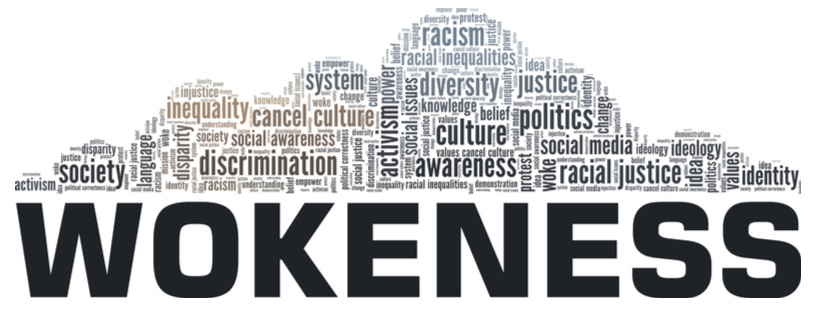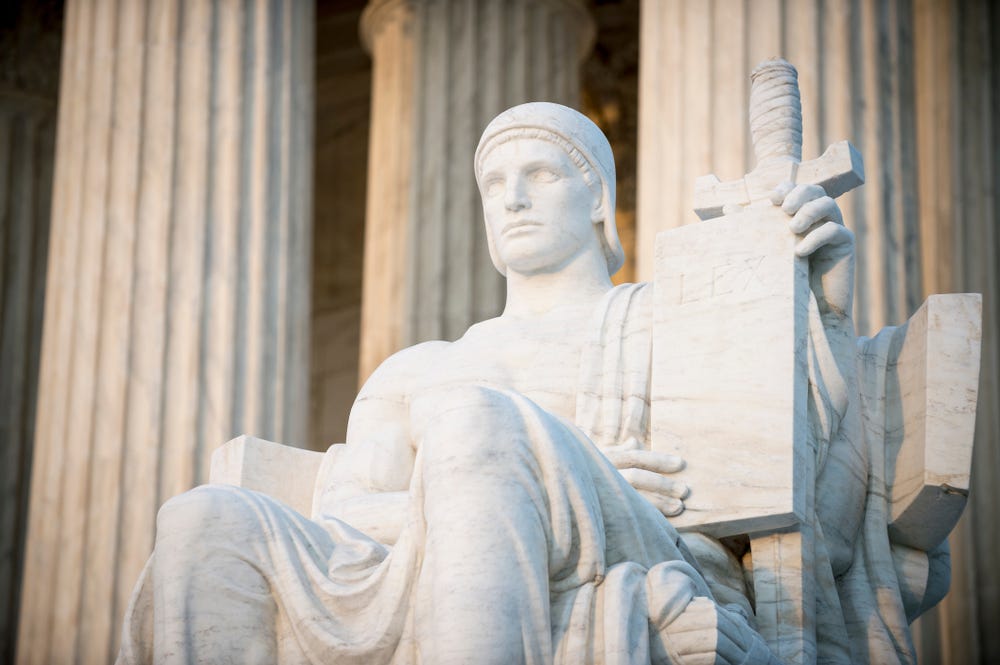E-Pluribus | July 7, 2022
Has "woke" had its 15 minutes, attacked by anti-racists, and there's a reason we write down our laws.
A round-up of the latest and best writing and musings on the rise of illiberalism in the public discourse:
Oliver Traldi: Peak Woke?
“Wokeness” could pull a Mark Twain with reports of its demise greatly exaggerated, but Oliver Traldi at City Journal sees at least some signs that it’s past its prime. The inherent contradictions in the woke worldview are frustrating even to those who promote it and a backing away from some of the worst excesses may be in the offing.
We can divide political strategies and conceptions of political ideology between those that involve trying to persuade people in their hearts and minds and those that try to gain power practically. In terms of the first approach, I think we’ve hit peak woke, by which I mean that wokeness is on the downswing. The Great Awokening is over, and even the most progressive people are starting to feel a hangover. Consider first the evidence for this proposition, then some of the possible causes.
A central type of evidence that we’ve hit peak woke comes from exhaustion with its mandates within its ostensible political home, progressive activism. This has been brewing for a while, but it was given convincing expression in Ryan Grim’s recent Intercept article, “Elephant in the Zoom: Meltdowns Have Brought Progressive Advocacy Groups to a Standstill at a Critical Moment in World History.” This piece simply demonstrates what anyone regularly talking to veterans in Washington, D.C., Democratic Party politics knows, which is that wokeness frustrates leaders in otherwise influential progressive nonprofit organizations.
It’s important to note that wokeness has had this effect in the progressive world for precisely the same reason that it has exasperated people in academia, journalism, and business. It tears institutions apart from the inside by encouraging people to see minor interactions as conflictual and victimizing, to respond catastrophically to events toward which they should show resilience, and to set up massive bureaucracies to deal with these sorts of disputes. If anything, wokeness is worse for political organizations, because its adherents see the internal politics of the organization as being as important as, or more so, than any external project. So a progressive nonprofit might feel internal pressure to conform to woke standards even as a progressive legislative agenda languishes.
Read it all.
Melissa Riley: I spoke up against racism in Virginia and was attacked by ‘anti-racists’
In keeping with the Peak Woke article above, parent Melissa Riley writes at the Washington Post about her frustration with her child’s school in Virginia, which she sees as undermining her attempts to raise her son without an undue emphasis on race, or worse, explicit segregation. Riley and other parents have sued over the “anti-racist” policies, alleging they are anything but.
I had raised some concerns with school staff members when I first discovered that they were bringing in a series of lessons centered on race. As it happens, my son has a mixed heritage: part White, part Native American and part Black. He is one of the few kids in his school with a darker skin tone. I didn’t want him to be in an environment in which everyone was focusing on his different skin color. But, shockingly, the school told me its proposed solution was that children of color would be offered a “safe space” outside the classroom while everyone else continued with the lessons.
To me, that was clear segregation.
Sadly, as things progressed, it became clear that the “anti-racism” policy behind these lessons was actually pushing a racist agenda rooted in critical race theory (CRT). Far from ensuring equal treatment of all students, the school district was teaching them that their skin color would determine their future. The policy pigeonholed students into “privileged” or “subordinate” categories based on lazy stereotypes that did not reflect their own personal drive, work ethic or ingenuity.
Rather than acknowledge parents’ concerns with the policy’s race-based classifications, the message from the school district was that CRT-based concepts were going to be woven into every aspect of our kids’ education — whether we liked it or not. If anything, once parents objected, the school district doubled down. It prioritized a racially divisive narrative over academic excellence.
Read it all here.
Kevin D. Williamson: Why We Write Our Laws Down
Reactions to recent Supreme Court opinions have been extreme to say the least, with calls to expand the court in order to obtain more favorable results and even calls for states to simply ignore the rulings. National Review’s Kevin Williamson says there’s a good reason why we chose to write down laws in the first place, a custom obviated by the notion that if we can just get enough judges to agree with a position, the words don’t matter.
The purpose of writing down a law is to fix its meaning. If you are going to live under a government of laws rather than a government of arbitrary power, then you have to know what benefits and privileges the law confers upon you and what duties and prohibitions it imposes on you. If the meaning of the law is not fixed — if, for example, you insist that your government is organized according to the principles of a “living constitution” — then you cannot know what the law is, because the law is only what some judge or functionary says it is at any particular moment. A man inclined to abide by the law can never be entirely sure that he is doing so, and he can never be entirely sure that he is breaking the law. Such an unknowable law is, properly speaking, no law at all — it does not meet the minimum requirement for functioning as law.
Another way of saying this is that law that is not fixed and knowable is only arbitrary power with a literary companion and a little democratic pretense. That is not to say that there will never be genuine, good-faith disagreements about what a law means, or that incompetent legislators will not make laws that are vague or imprecise, or that the regulations touching very complex activities will not be at times bewildering. It is only to say that judges and courts are to behave as an instrument of the law rather than using the law as an instrument of their own power for their ends, however just and enlightened they are convinced those ends are.
[ . . . ]
What our current agonies over the Supreme Court make plain above all else is the crying need for precisely the judicial attitude and practice associated with figures such as Antonin Scalia, Clarence Thomas, and Robert Bork — a jurisprudence in which the legitimacy of the courts and their judges is derived from their dedication to acting as disinterested servants of the law rather than as power-seeking political actors. That means taking phrases such as “Congress shall make no law” and “the right of the people” seriously rather than regarding them as obstacles to the incremental pursuit of some private utopia.
Of course there is a place for legal theory, for competing schools of thought, and for disagreements among scholars. But there are necessities that are prior to these: honesty, humility, duty. And the judicial activists who dominated our courts for far too long lack those things. So do most of those who decry Dobbs as some kind of unprecedented abomination rather than the long-overdue righting of a wrong, reversing an abuse of law and democracy both.
Read the whole thing.
Around Twitter
A short back and forth (excerpts of the discussion) on liberalism, “enforcement” of its principles, and the inherent difficulties in even defining how such a mechanism would operate:
Matt Taibbi on “censorship” versus “First Amendment violation”
And finally, Duke basketball’s Kara Lawson with an inspiring talk:









